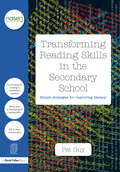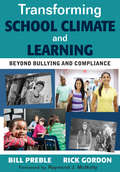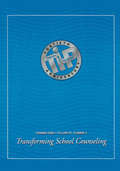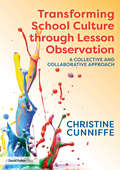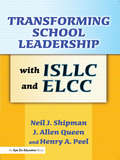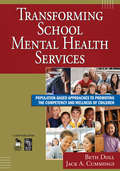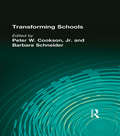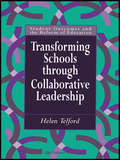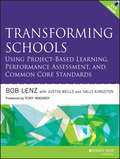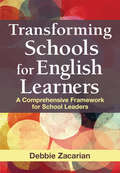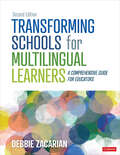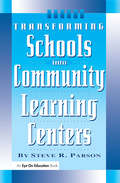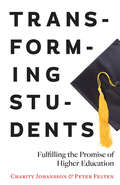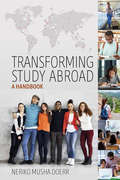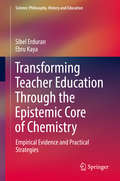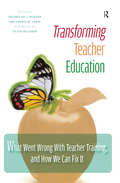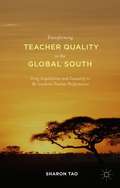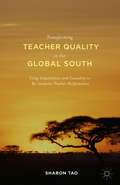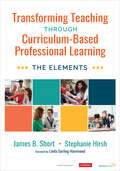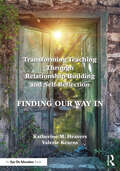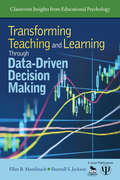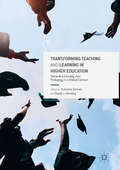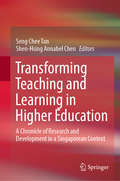- Table View
- List View
Transforming Reading Skills in the Secondary School: Simple strategies for improving literacy (nasen spotlight)
by Pat GuyTransforming Reading Skills in the Secondary School is a commonsense text designed to help practitioners working in a mainstream context. The book suggests ways to develop the underlying skills necessary for good reading through multiple pathways such as mainstream subject lessons, individual and small group support sessions, whole school initiatives, the use of reading mentors and home-school liaison opportunities. Brimming with ideas and activities, Pat Guy explores a variety of different aspects of reading, including: how reading is taught and why it is such an important skill for the individual how to motivate the reluctant reader the role played by the mainstream & specialist teacher underlying problems pupils may face how to increase parental involvement reasons why a pupil’s comprehension might be limited the role of the School Librarian the relevance to reading of vocabulary and general knowledge. Anyone wanting to develop the reading skills of secondary pupils who struggle will find this a resource they return to time and time again.
Transforming School Climate and Learning: Beyond Bullying and Compliance
by William K. Preble Rick M. GordonCreating safe schools from the inside out This book details a comprehensive process for empowering students and teachers as school improvement leaders and “experts.” Bill Preble and Rick Gordon explain how schools can use the SafeMeasures™ collaborative action research process to: Collect and analyze school climate data Develop improvement goals Create exciting and inspiring action plans to dramatically improve their school’s climate and student engagement Each chapter features success stories from real schools, strategies and implementation activities, and book study questions that help all stakeholders transform both their school climate and student learning.
Transforming School Counseling: A Special Issue of Theory Into Practice
by Susan Jones SearsFirst Published in 2005. This is Volume 41 of the Theory Into Practice series, with focus on Transforming School Counseling, featuring guest editor Susan Jones Sears. This issue showcases a close examination of educational practices in schools serving low-income and minority students with disturbing trends. The articles discuss the findings that students in high-poverty and high-minority schools see little connection between what is being taught and a better future for themselves. Also contained are a variety of proposed reasons to explain why many school counselors are not considered to be change agents.
Transforming School Culture through Lesson Observation: A Collective and Collaborative Approach
by Christine CunniffeThis book sets out a three-stage programme for lesson observation showing how a collaborative whole-school approach can transform the culture of the staffroom and improve outcomes for pupils. Focusing on the emotional environment of the classroom, the relationships between teachers and pupils, and teaching and learning outcomes, it will enable schools to provide a consistent approach to lesson observation where good practice can be celebrated and shared. Revealing the positive impact of the programme on pupils’ engagement and exam results, co-operation between departments and teacher wellbeing, the book: Provides clear guidance on implementing the programme and adapting it for different contexts. Shows how data can be used for both Ofsted and Independent Schools Inspectorate (ISI) inspection documentation. Adresses key issues such as culture, staff psychological contracts, the emotional environment of the school and leadership development. If you are looking to make real impact within your school and bring about change for the better, the three-stage lesson observation programme is the tool for you. This innovative approach brings consistency, parity and fairness to lesson observation creating a secure and safe environment in which pupils can learn and teachers can teach.
Transforming School Leadership with ISLLC and ELCC
by J. Allen Queen Henry Peel Neil ShipmanAuthoritative and practical, this book is co-authored by Neil Shipman, former ISLLC Director. It provides kknowledge and tools to help principals-in-training and practitioners apply the ISLLC and ELCC standards in their schools. Each chapter contains a research-based discussion and practical applications of the standard, along with suggested activities, assignments, and case studies.
Transforming School Mental Health Services: Population-Based Approaches to Promoting the Competency and Wellness of Children
by Dr Beth Doll Jack A. CummingsProvides a comprehensive ten-step sequence for implementing population-based services that improve wellness and academic success for individual students and entire schools, and offers suggestions for engaging parents.
Transforming Schools
by Peter W. Cookson Barbara SchneiderFirst Published in 1995. Routledge is an imprint of Taylor & Francis, an informa company.
Transforming Schools
by Helen TelfordFirst published in 1996. Routledge is an imprint of Taylor & Francis, an informa company.
Transforming Schools Using Project-Based Learning, Performance Assessment, and Common Core Standards
by Bob Lenz Justin Wells Sally KingstonIt's not what students know, but what they do with what they know that is important Schools are changing in response to this reality, and in Transforming Schools Using Project-Based Learning, Performance Assessment, and Common Core Standards, Bob Lenz, Justin Wells, and Sally Kingston draw on the example of the Envision Education schools, as well as other leading schools around the country, to show how the concept of deeper learning can meet the need for students who are both college and career ready and engaged in their own education. In this book, the authors explain how project-based learning can blend with Common Core-aligned performance assessment for deeper learning. You'll discover how many schools have successfully made the transition from traditional, teacher-centered learning to project-based, deeper learning and find many practical ideas for implementation. Companion DVD and website include videos showing how to implement deeper learning strategies in the classroom Evidence-based descriptions show why deeper learning is right for students Performance assessment experts explain how to align assessments with Common Core by shifting the emphasis from knowing to doing Extensive game plan section provides step-by-step guidance for change Schools are complex organizations, and transformation involves all of the stakeholders, from students to superintendents. But as this book shows, there are amazing benefits to be realized when everyone commits to diving deeper into learning.
Transforming Schools for English Learners: A Comprehensive Framework for School Leaders
by Debbie ZacarianPosition your school to successfully teach English learners Could your school be more effective at instructing its English learners? Whether you are just beginning to work with an emergent population or need to improve your program, this book provides a comprehensive framework for improving ELs’ academic performance and school engagement through visionary planning of EL education programming. The author addresses such critical topics as: Selecting the appropriate program model for your school Creating effective student course schedules for language development and content Making data-driven decisions using effective measures of student performance learning Effectively using Response to Intervention (RTI)
Transforming Schools for Multilingual Learners: A Comprehensive Guide for Educators
by Debbie ZacarianEssential principles, practices, and structures for multilingual learners Much has changed in the ten years since this book was first published. A celebrated triumph, it provided state, district, school, and teacher leaders with a comprehensive guide to support multilingual learners to reach their full potential. From selecting the appropriate program model to partnering with families and infusing federal and state laws governing the education of multilingual learners and the rights of their families into all we do, the key messages that made the first edition of this book a renowned success have been re-examined in the second edition with a robust lens to meet these demanding times. This second edition supports educators to design and enact policies, practices, and structures for multilingual learners (MLs) to feel a sense of safety, belonging, value, and competence. Topics explored in the book include: a discussion of the changes to federal and state policies and their impact on MLs and their families strategies to move from a deficit- to an asset-based approach that values multilingualism nine principles to design and deliver high-quality lessons in multiple languages and across disciplines practices to identify and support MLs with learning differences and disabilitiessteps for building long-lasting family-school partnerships Reflecting changing trends in leadership, this new edition supports superintendents, principals, curriculum supervisors, coaches, mentors, teachers, and other stakeholders in their collaborative efforts to create and sustain successful language assistance programs.
Transforming Schools for Multilingual Learners: A Comprehensive Guide for Educators
by Debbie ZacarianEssential principles, practices, and structures for multilingual learners Much has changed in the ten years since this book was first published. A celebrated triumph, it provided state, district, school, and teacher leaders with a comprehensive guide to support multilingual learners to reach their full potential. From selecting the appropriate program model to partnering with families and infusing federal and state laws governing the education of multilingual learners and the rights of their families into all we do, the key messages that made the first edition of this book a renowned success have been re-examined in the second edition with a robust lens to meet these demanding times. This second edition supports educators to design and enact policies, practices, and structures for multilingual learners (MLs) to feel a sense of safety, belonging, value, and competence. Topics explored in the book include: a discussion of the changes to federal and state policies and their impact on MLs and their families strategies to move from a deficit- to an asset-based approach that values multilingualism nine principles to design and deliver high-quality lessons in multiple languages and across disciplines practices to identify and support MLs with learning differences and disabilitiessteps for building long-lasting family-school partnerships Reflecting changing trends in leadership, this new edition supports superintendents, principals, curriculum supervisors, coaches, mentors, teachers, and other stakeholders in their collaborative efforts to create and sustain successful language assistance programs.
Transforming Schools into Community Learning Centers
by Stephen ParsonThis book shows how schools can provide services to all members of the community, not just to children of school age. It also demonstrates how a school's instructional program and facilities can include community resources.
Transforming Students: Fulfilling the Promise of Higher Education
by Peter Felten Charity JohanssonCollege has the power to transform students into intentional, critical, and engaged people.The recent trend of trying to measure higher education’s return on investment misses a fundamental point, argue Charity Johansson and Peter Felten. The central purpose of a college or university is to transform the lives of students—not to merely change them or help them mature. This transformation is an ongoing process of intentionally aligning one’s behavior with one’s core sense of personal identity. It is the university’s central role to lead students in this transformation, a process that shapes students into intentional, critical, and engaged individuals.Recognizing the remarkable influence of the college experience on peoples’ lives, the authors offer a guide to how colleges and universities can effectively lead students through this life-changing process. Drawn from extensive interviews with students and graduates, faculty and staff, Transforming Students gathers diverse stories to show how students experience the transformation process, which rarely follows a neat or linear path. The interviews illustrate central themes from the literature on transformative learning and the undergraduate student experience.A sequel of sorts to George Keller’s classic Transforming a College—which chronicled Elon University’s metamorphosis from struggling college to a top regional university—Transforming Students addresses the school’s core educational mission: to shape students into engaged adults who embrace learning as a lifelong endeavor. Given this effect, the college experience is much more than preparation for a career. It is preparation for life.
Transforming Study Abroad: A Handbook
by Neriko Musha DoerrWritten for study abroad practitioners, this book introduces theoretical understandings of key study abroad terms including “the global/national,” “culture,” “native speaker,” “immersion,” and “host society.” Building theories on these notions with perspectives from cultural anthropology, political science, educational studies, linguistics, and narrative studies, it suggests ways to incorporate them in study abroad practices. Through attention to daily activities via the concept of immersion, it reframes study abroad not as an encounter with cultural others but as an occasion to analyze constructions of “differences” in daily life, backgrounded by structural arrangements.
Transforming Teacher Education Through the Epistemic Core of Chemistry: Empirical Evidence and Practical Strategies (Science: Philosophy, History and Education)
by Sibel Erduran Ebru KayaThis book synthesizes theoretical perspectives, empirical evidence and practical strategies for improving teacher education in chemistry. Many chemistry lessons involve mindless “cookbook” activities where students and teachers follow recipes, memorise formulae and recall facts without understanding how and why knowledge in chemistry works. Capitalising on traditionally disparate areas of research, the book investigates how to make chemistry education more meaningful for both students and teachers. It provides an example of how theory and practice in chemistry education can be bridged. It reflects on the nature of knowledge in chemistry by referring to theoretical perspectives from philosophy of chemistry. It draws on empirical evidence from research on teacher education, and illustrates concrete strategies and resources that can be used by teacher educators. The book describes the design and implementation of an innovative teacher education project to show the impact of an intervention on pre-service teachers. The book shows how, by making use of visual representations and analogies, the project makes some fairly abstract and complex ideas accessible to pre-service teachers.
Transforming Teacher Education: What Went Wrong with Teacher Training, and How We Can Fix It
by Chance W. Lewis Valerie Hill-JacksonExtracts from the text:"Why are fifteen million children and youth in poverty not achieving when we know that low-income students excel in the classrooms of “star” teachers (who comprise approximately 8 percent of the teaching force)?" "Whose needs or interests are being met in education reform today?" “In my own institution, there has not been a systematic assessment of the effectiveness of the basic teacher education program since the institution was founded over a century ago as a teachers college. Imagine, not one ever!”"Teachers who empathize with students and the life challenges they face soon realize that the dysfunctional bureaucracies will not permit them to meet the needs of their students. Half of the starry-eyed beginners are gone in five years or less." "Why does teacher education focus on the managerial, instrumental or delivery system aspects of the profession?""The expert advice dispensed by schools of education regarding what future teachers should do is not connected to any theory of learning, or to any reality of life in school classrooms." "Why has the recruitment process resulted in a cohort of teachers who are unable to connect with their students?""Does a qualified teacher equate to a quality teacher?""The best hope of getting more effective teachers from university teacher preparation programs is to base their budgets on the number of their graduates who serve in challenging schools and their effectiveness with children and youth. At the district level, the salaries of hiring officials should be based on how well these officials identify and retain quality teachers."In this book, 12 distinguished scholars provide a hard-hitting, thoroughly researched, historical and theoretical critique of our schools of education, and offer clear recommendations on what must be done to ensure all children can achieve their potential, and contribute to a vibrant, democratic society.
Transforming Teacher Quality in the Global South: Using Capabilities and Causality to Re-examine Teacher Performance
by Sharon TaoTransforming Teacher Quality in the Global South.
Transforming Teacher Quality in the Global South: Using Capabilities and Causality to Re-examine Teacher Performance
by Sharon TaoA common story of teachers from the Global South portrays them as deficient, unreliable and unprofessional. However, this book uses an innovative Capability Approach/Critical Realist lens to reveal the causal links between teachers' constrained capabilities and their 'criticised' behaviours and offer nuanced, creative strategies for improvements.
Transforming Teaching Through Curriculum-Based Professional Learning: The Elements
by Jim Short Stephanie HirshThe future of professional learning starts here. Even the most experienced teachers provided with the highest quality instructional materials benefit from additional support to ensure student success. Simply adopting new instructional materials is unlikely to significantly change teacher practice. Ensuring a level of excellence that benefits all students calls for an approach to professional learning that is anchored in the use of high-quality curriculum and grounded in immersive learning experiences for all teachers. Transforming Teaching Through Curriculum-Based Professional Learning offers a framework for practitioners looking to undertake this work. The curriculum-based professional learning detailed here enables teachers to deepen their understanding of the essential components of successful curriculum implementation and work together to provide instruction that has a positive impact on student engagement and learning. Features include Detailed case studies based on actual schools and districts that illustrate the elements of curriculum-based professional learning in action Detailed guidance on the roles and responsibilities of teachers, administrators, and other stakeholders Comparison charts that show the distinctions between curriculum-based professional learning and more traditional forms of professional development Elements icons that help readers navigate each chapter of the book Teachers’ jobs are changing in real time. When they are supported with both high-quality instructional materials and curriculum-based professional learning, they can position our schools to achieve the dual goals of equity and excellence.
Transforming Teaching Through Curriculum-Based Professional Learning: The Elements
by Jim Short Stephanie HirshThe future of professional learning starts here. Even the most experienced teachers provided with the highest quality instructional materials benefit from additional support to ensure student success. Simply adopting new instructional materials is unlikely to significantly change teacher practice. Ensuring a level of excellence that benefits all students calls for an approach to professional learning that is anchored in the use of high-quality curriculum and grounded in immersive learning experiences for all teachers. Transforming Teaching Through Curriculum-Based Professional Learning offers a framework for practitioners looking to undertake this work. The curriculum-based professional learning detailed here enables teachers to deepen their understanding of the essential components of successful curriculum implementation and work together to provide instruction that has a positive impact on student engagement and learning. Features include Detailed case studies based on actual schools and districts that illustrate the elements of curriculum-based professional learning in action Detailed guidance on the roles and responsibilities of teachers, administrators, and other stakeholders Comparison charts that show the distinctions between curriculum-based professional learning and more traditional forms of professional development Elements icons that help readers navigate each chapter of the book Teachers’ jobs are changing in real time. When they are supported with both high-quality instructional materials and curriculum-based professional learning, they can position our schools to achieve the dual goals of equity and excellence.
Transforming Teaching Through Relationship-Building and Self-Reflection: Finding Our Way In
by Katherine M. Heavers Valerie KearnsCreating connections with and among students is at the heart of all good teaching. In order to do this, we must identify and address the obstacles, conscious and unconscious, getting in the way of this goal. Authors Katherine M. Heavers and Valerie Kearns show how to build authentic relationships that focus on trust and voice while honoring the differences in individuals’ experiences and learning styles.This book covers topics such as fostering trust, wielding language with intention, nurturing emotional safety, offering meaningful feedback, unearthing and confronting bias, and promoting student voice. The authors encourage educators to do their own inner work to embrace vulnerability, which can help them to grow personally and, as a result, better nurture student growth. As a byproduct of this deep reflection, the authors intend for you to enjoy heightened psychological flexibility and experience more joy, both of which will enable you to better serve your students. Each chapter concludes with reflection questions and activities to support, challenge, and extend thinking.Whether reading the book on your own or with colleagues, you will come away feeling supported on your journey as you strive to create meaningful connections that lead to lasting learning and empowered communities.
Transforming Teaching and Learning Through Data-Driven Decision Making
by Ellen B. Mandinach Sharnell S. JacksonConnect data and instruction to improve practice Gathering data and using it to inform instruction is a requirement for many schools, yet educators are not necessarily formally trained in how to do it. This book helps bridge the gap between classroom practice and the principles of educational psychology. Teachers will find cutting-edge advances in research and theory on human learning and teaching in an easily understood and transferable format. The text’s integrated model shows teachers, school leaders, and district administrators how to establish a data culture and transform quantitative and qualitative data into actionable knowledge based on: Assessment Statistics Instructional and differentiated psychology Classroom management
Transforming Teaching and Learning in Higher Education
by Ruksana Osman David J HornsbyUniversities face the prospect of becoming redundant unless the way teaching and learning takes place changes. This book explores the idea of transformation and pedagogy, In particular, it will highlight how universities are transformed through a set of pedagogical interventions and stances that integrate a sense of moral and ethical purpose to learning. Actively integrating cultural pluralism in developing knowledge and understanding aspires to liberate the learner from existing power structures by fostering a desire to challenge and change the social system in which we live and connects the reality around us and its many problems to the knowledge generation process.
Transforming Teaching and Learning in Higher Education: A Chronicle of Research and Development in a Singaporean Context
by Seng Chee Tan Shen-Hsing Annabel ChenThis book chronicles the journeys of educational researchers and academics who have engaged in research and development to improve teaching and learning at universities. It highlights the research evidence, approaches, and in many cases, the journey of transformation rather than prescribing certain principles of and approaches to effective instruction. In other words, it not only describes the destination, but also various pathways leading toward it. Further, it focuses on mechanisms for improving the approaches discussed, rather than simply determining whether one works better than the other. As such, novice and seasoned academics and teaching staff in higher education will benefit from this book, not just from the teaching and learning approaches it highlights, but also from the insights into the respective journeys. The research and development methods and approaches discussed here will also appeal to researchers working in teaching and learning in higher education.
